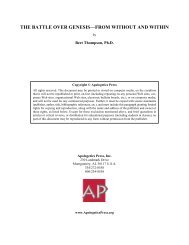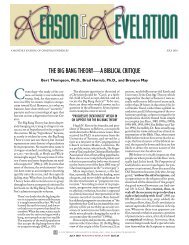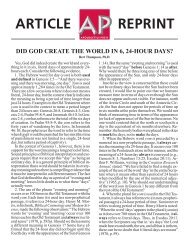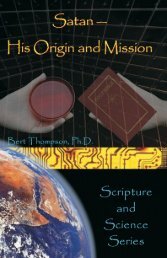The Many Faces, and Causes, of Unbelief - Apologetics Press
The Many Faces, and Causes, of Unbelief - Apologetics Press
The Many Faces, and Causes, of Unbelief - Apologetics Press
You also want an ePaper? Increase the reach of your titles
YUMPU automatically turns print PDFs into web optimized ePapers that Google loves.
sin? No, they were no worse sinners than their peers. <strong>The</strong>y<br />
died because a natural law was in force. Fortunately, natural<br />
laws work continually so that we can underst<strong>and</strong> <strong>and</strong> benefit<br />
from them. We are not left to sort out some kind <strong>of</strong> haphazard<br />
system that works one day but not the next.<br />
In the end, the most important question is not, “Why did<br />
‘this’ or ‘that’ happen to me?,” but instead, “How can I underst<strong>and</strong><br />
what has happened, <strong>and</strong> how am I going to react to it?”<br />
As McGrath put it:<br />
<strong>The</strong> sufferings <strong>of</strong> this earth are for real. <strong>The</strong>y are painful.<br />
God is deeply pained by our suffering, just as we<br />
are shocked, grieved, <strong>and</strong> mystified by the suffering<br />
<strong>of</strong> our family <strong>and</strong> friends. But that is only half <strong>of</strong> the<br />
story. <strong>The</strong> other half must be told. It is natural that<br />
our attention should be fixed on what we experience<br />
<strong>and</strong> feel here <strong>and</strong> now. But faith dem<strong>and</strong>s that we raise<br />
our sights <strong>and</strong> look ahead to what lies ahead. We may<br />
suffer as we journey—but where are we going? What<br />
lies ahead? (1993, pp. 105-106).<br />
As much as the unbeliever hates to admit it, there are times<br />
when suffering actually is beneficial. Think <strong>of</strong> the man whose<br />
chest begins to throb as he enters the throes <strong>of</strong> a heart attack.<br />
Think <strong>of</strong> the woman whose side begins to ache at the onset <strong>of</strong><br />
acute appendicitis. Is it not true that pain <strong>of</strong>ten sends us to the<br />
doctor for prevention or cure? Is it not true also that at times<br />
suffering helps humankind develop the traits that people treasure<br />
the most? Bravery, heroism, altruistic love, self-sacrifice—all<br />
flourish in less-than-perfect environments, do they<br />
not? Yet people who exhibit such traits are cherished <strong>and</strong> honored<br />
as having gone “above <strong>and</strong> beyond the call <strong>of</strong> duty.”<br />
Was this not the very point Christ was making when He said:<br />
“Greater love hath no man than this, that a man lay down his<br />
life for his friends” ( John 15:13)?<br />
Instead <strong>of</strong> blaming God because evil, pain, <strong>and</strong> suffering<br />
exist, we should turn to Him for strength, <strong>and</strong> let tragedies, <strong>of</strong><br />
whatever nature, remind us that this world never was intended<br />
to be a final home (Hebrews 11:13-16). Our time here is temporary<br />
(James 4:14), <strong>and</strong> with God’s help, we are able to over-<br />
- 102

















